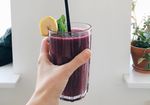Good things often come in small packages — and that’s especially true of kiwi. Known for its tart taste and fuzzy skin, the fruit packs plenty of digestion-helping fiber, disease-fighting antioxidants and other beneficial nutrients into each oblong serving.
Depending on the region, kiwis are in season between November and January, according to Laura Allen, professional chef and Director of Food and Beverage for THE WELL Kitchen and Table. That said, they’re typically paired with tropical eats such as mango and pineapple, adds Allen, making them a rather summery treat — and one that delivers plenty of perks, too.
Find out more about the health benefits of kiwi below.
Kiwi Nutrition
Forget about gum, kiwi is the real juicy fruit, as one kiwi (2-inch diameter, 69 grams) contains almost 60 grams of water, according to the United States Department of Agriculture (USDA). Another way to think about it: “Kiwis are about 80-90 percent water and thus, very hydrating,” says Lauren Burkowski, MS, Health Coach for THE WELL New York.
According to a 2018 article in the European Journal of Nutrition, the produce is rich in gut-friendly fiber and disease-busting antioxidants. It also offers essential vitamins and minerals, including folate, vitamins C and E and potassium. Needless to say, kiwi certainly deserves a place in your fruit bowl.
Health Benefits of Kiwi
Staves Off Chronic Disease
One of the most impressive aspects of kiwi nutrition is its antioxidants. This includes compounds such as carotenoids, chlorophyll, polyphenols and vitamins C and E, according to the 2018 article. Antioxidants are crucial for overall health because they combat and control potentially harmful free radicals. When in excess, these molecules can cause oxidative stress and damage healthy cells, thereby increasing the risk of chronic diseases, such as cancer or type 2 diabetes. Antioxidants, such as those found in kiwi, can help reduce your risk for such conditions by minimizing this cellular damage.
Boosts Immune Function
If kiwi had a claim to fame, its vitamin C content would likely be it. After all, one kiwi (69 grams) contains 64 micrograms of the micronutrient; this is about 71 percent of the recommended daily allowance (RDA) for men and 85 percent of the RDA for non-pregnant or breastfeeding women, according to the National Institutes of Health (NIH).
RELATED: 30 Ways to Strengthen Your Immunity
So why is this a big deal? Vitamin C is an essential nutrient that supports many aspects of the body, including the immune system, says Valerie Agyeman, RD, a women's health dietitian and host of the Flourish Heights podcast. “Vitamin C promotes the production of white blood cells, which help the body fight off infections."
“It also plays a big role in helping maintain healthy skin,” she adds. This contributes to overall health, as the skin acts “as a barrier against harmful invaders like germs,” notes Agyeman.
Promotes Healthy Digestion
While all that water in kiwis can definitely keep your system running smoothly, the fruit’s fiber plays a role, too. “Kiwi contains both soluble and insoluble fiber,” shares Agyeman. Soluble fiber dissolves in water and forms a gel, which can help absorb excess fluid and ease gastrointestinal woes (e.g. diarrhea). “Insoluble fiber adds bulk to the stool and keeps it moving through the digestive tract,” says Agyeman. This can help support regular bowel movements and relieve (or prevent) constipation.
RELATED: Decoding Your Digestion
Supports Heart Health
Another kiwi health benefit? The ability to keep your ticker, well, ticking. For starters, the antioxidants in kiwi can help protect cholesterol from oxidation — a process that changes cholesterol molecules into harmful substances that may increase the risk of heart disease, according to Agyeman. Additionally, soluble fiber — such as that found in kiwi — can bind to cholesterol in the GI tract. When the fiber leaves the body via the stool, it brings along the cholesterol, ultimately preventing it from entering the bloodstream and increasing cholesterol levels. This is key because high blood cholesterol is a major risk factor for heart disease, according to the American Heart Association.
Protects Eyes
According to the 2018 article, kiwi offers carotenoids (i.e. plant pigments) called lutein, zeaxanthin and beta-carotene — all of which have antioxidant properties. Meaning they can protect your peepers from oxidative stress, a situation that could otherwise contribute to eye conditions, such as glaucoma and cataracts. Eating carotenoid-rich foods (see: kiwi), however, may help reduce the risk. What’s more, in the body, beta-carotene turns into vitamin A, an essential nutrient for healthy vision.
How to Choose Kiwi
In the grocery store, kiwi is often sold fresh, though you might be able to find it frozen on its own or with other fruits. When choosing fresh kiwi, pick one that feels heavy for its size, smells fruity and gives slightly when you touch it, according to Allen.
At home, store kiwis on the countertop so that they can continue to ripen. “If they are ripening too quickly, you can store [them] in the fridge,” says Allen. When you’re ready to reap the health benefits of kiwi, “cut [the fruit] down the middle and scoop out the flesh from the skin with a spoon,” explains Allen. The skin is also edible, but most people use the scooping method or peel away the skin first.
How to Eat Kiwi
Thanks to their juicy texture and tart-sweet flavor, kiwis are wonderfully versatile. Here are a few ideas to get you started:
Fruit Smoothie
To elevate the flavor of your next smoothie, add a fresh or frozen kiwi. Try it with coconut milk or water for serious tropical vibes. And if you don’t finish your drink, you can make…
Ice Pops
Pour any remaining smoothie into ice pop molds for a tasty frozen treat. You can also add fresh kiwi slices before freezing for an eye-catching visual.
Fruit Salad
The vibrant green color of kiwi is perfect for brightening up your next fruit salad. As mentioned, the fruit works exceptionally well with warm weather produce, such as mango or papaya — "vitamin C fruits play well together," notes Allen.
Cocktails
Kiwis are great for muddling into cocktails (or mocktails!), “particularly if your kiwi isn’t picture perfect when you open it,” according to Allen. You can also blend kiwi and lime juice in a blender, then add the liquid to cocktails, seltzer or plain water.
Chips
Cut kiwis into 1/4-inch thick slices (no need to peel!) and pop them into a dehydrator at 135 degrees F (or an oven at 140 degrees F) for at least 8 hours. Once complete, they'll tase like "sweet and sour candy," says Allen.




